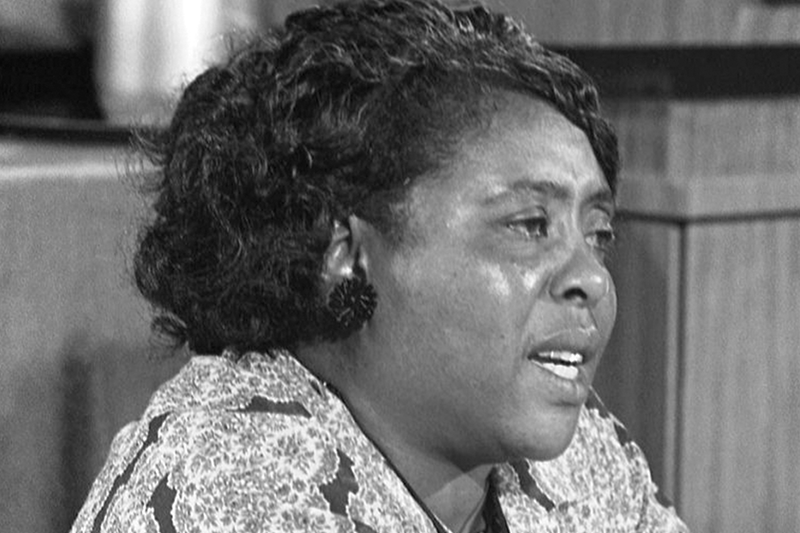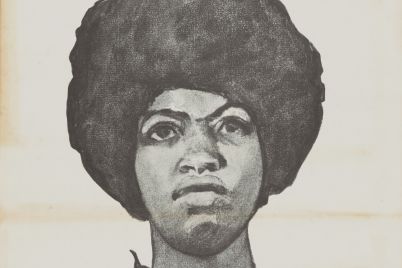BY KEISHA BELL | Visionary Brief
Are you aware of her cries, or have they faded out amongst the sounds of cash machines and continued injustices?
The last of 20 siblings, she was courageous and bold. She was literate–an impressive accomplishment in and of itself during a time when societal protocol preferred otherwise. Many say they want strong leadership, but what happens when it looks like her?
Meet Fannie Lou Townsend Hamer. In 1971, Hamer co-founded the National Women’s Political Caucus, an organization created to recruit, train and support women of all races who wish to seek election to government office. The need for strong, female voices in the political sphere is not a new concept, nor is it new that those voices need to include strong women of color.
In 1964, Hamer co-founded and was vice-chair of the Mississippi Freedom Democratic Party (MFDP). This was created to counter the regional all-white Democratic Party’s attempts to restrict African-American voices. A goal of MFDP was to ensure that there was a party that was indeed for all people, a party that did not tolerate any form of exploitation and discrimination, especially towards minorities. Hamer represented MFDP at the 1964 Democratic National Convention.
A true visionary, Hamer was also a voting rights activist and a community organizer. In 1963, she became a field secretary for the Student Nonviolent Coordinating Committee (SNCC). Hamer organized Mississippi’s Freedom Summer along with other members of SNCC. She believed that the Civil Rights Movement should be multi-racial.
At six years old, Hamer picked cotton with her family. She attended the plantation’s one-room school provided for the sharecroppers’ children. There, she discovered her love for reading. Hamer had to leave school, however, at 12 years old to help support her aging parents. Although she had a disfigured leg, she picked 200–300 pounds of cotton daily by age 13.
Although in 1870, the 15th Amendment to the U.S. Constitution gave African-American men the right to vote, black women could not vote until 1920 and the 19th Amendment, which gave all women the right to vote. Hamer was born on October 6, 1917, but had only first learned that she had a constitutional right to vote in 1962. Knowledge is power and is a catalyst for empowerment.
After learning that she had a right to vote, Hamer went to register to vote. She failed the registration test. It was designed to deter African Americans and Native Americans from voting.
As punishment for attempting to register, the plantation owner fired her and kicked her off of his plantation. Reportedly she was told, “we’re not ready for that in Mississippi.”
Hamer was shot at 16 times by white supremacists who disapproved of her wanting to vote. Even more determined, she took the test again. Again, she failed. Not giving up, she passed on her third attempt.
When she attempted to vote that fall, however, she discovered her registration was not enough as the county required voters to have two poll tax receipts. Can you imagine her disappointment? Hamer later paid for and acquired the requisite poll tax receipts.
At one point, Hamer was arrested. Once in county jail, she was taken to a cell where a state trooper ordered two inmates to beat her using a blackjack. Reportedly during this attack, Hamer was repeatedly groped by officers.
She never fully recovered from the beatings. Still, she returned to Mississippi to organize voter registration drives. She helped thousands of African Americans register to vote.
At 44, Hamer had surgery to remove a tumor and was given a hysterectomy without her consent. This was a common practice under Mississippi’s compulsory sterilization plan to reduce the number of poor blacks in the state.
In Jan. of 1972, Hamer was hospitalized for nervous exhaustion. Later that same year, she was elected as a national democratic party delegate. Two years later, she was hospitalized again for a nervous breakdown.
Hamer died at the age of 59 on March 14, 1977. Her tombstone reads: “I am sick and tired of being sick and tired.”
Remember her blood, sweat and tears. She was posthumously inducted into the National Women’s Hall of Fame in 1993. Don’t forget her name.
Keisha Bell is an attorney, author, and public servant. www.emergingfree.com








